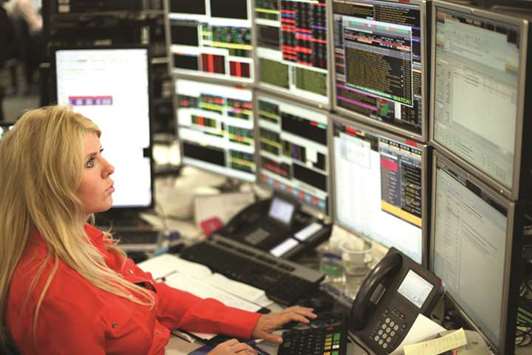The dollar tumbled against major rivals yesterday, with the euro reaching a three-year high as US Treasury Secretary Steven Mnuchin said that a weaker dollar was good for the US economy.
“Obviously a weaker dollar is good for us, is good as it relates to trade and opportunities, but longer-term I think the strength of the dollar is a reflection of the strength of the US economy...” Mnuchin said at the World Economic Forum in Davos.
His comments were widely interpreted as a green light from Washington to let the value of the dollar crumble so US exports become cheaper for buyers in other countries.
“The US dollar bloodbath continues,” said James Hughes at Axitrader, and is “becoming just as much a hallmark of the Trump presidency as the equity market rally”, he observed.
“The dollar isn’t dead,” Hughes wrote in a note to clients, “but it certainly has a problem with Trump. Who doesn’t!”
In yesterday trading, the euro reached $1.2402 – the highest level since December 2014.
“Mnuchin said what we all know, that a weaker dollar is ‘good’ for US trade,” said Fawad Razaqzada, market analyst at Forex.com.
The dollar had already been weakened by US President Donald Trump’s announcement earlier this week of steep tariffs on imports of solar panels and large washing machines, angering China and South Korea.
US Commerce Secretary Wilbur Ross, also in Davos, defended the tariffs and said Washington would not flinch from reprisals against countries that flout the rules.
The dollar’s sell-off was also helped by investors betting on tighter monetary policies by major central banks, bringing them in line with the Federal Reserve.
The greenback fell below 110 yen for the first time since September, and the pound shot up to hit $1.4241.
The European single currency also profited from accelerating business activity in the eurozone, while sterling won a boost from rising expectations of more UK interest-rate rises this year after British unemployment data was well-received by markets.
Investors are now looking to Thursday’s European Central Bank meeting for any reaction by ECB chief Mario Draghi to the euro’s surge amid strong signs that the bank is planning to wind down its support for the bond market and ultimately raise interest rates.
But any prolonged strength of the euro would already go a long way in that direction as the currency’s strength puts an unwelcome damper on inflation which the ECB is desperately trying to rekindle.
“Draghi will have to clarify things,” Societe Generale economist Michel Martinez said.
As so often before, the smooth-talking ECB chief will likely play for time in hopes that other factors – such as wage growth in the eurozone – will fire price growth, many analysts expect.
In commodities trading, gold hit a four-month high at $1,349.40 an ounce as the US currency weakened, while oil futures stabilised.
Europe’s main stock markets fell as rising local currencies weighed on multinationals earning in dollars.
London’s FTSE 100 lost 1.1% to 7,643.43 points, Frankfurt’s DAX 30 was down 1.1% at 13,414.74 in Paris CAC 40 fell 0.7% to 5,495.16 at close yesterday.
By contrast, Wall Street showed solid gains as the weak dollar favoured US exporters, likely boosting their foreign earnings.

A trader is seen at the London Stock Exchange. The FTSE 100 lost 1.1% to 7,643.43 points yesterday.
